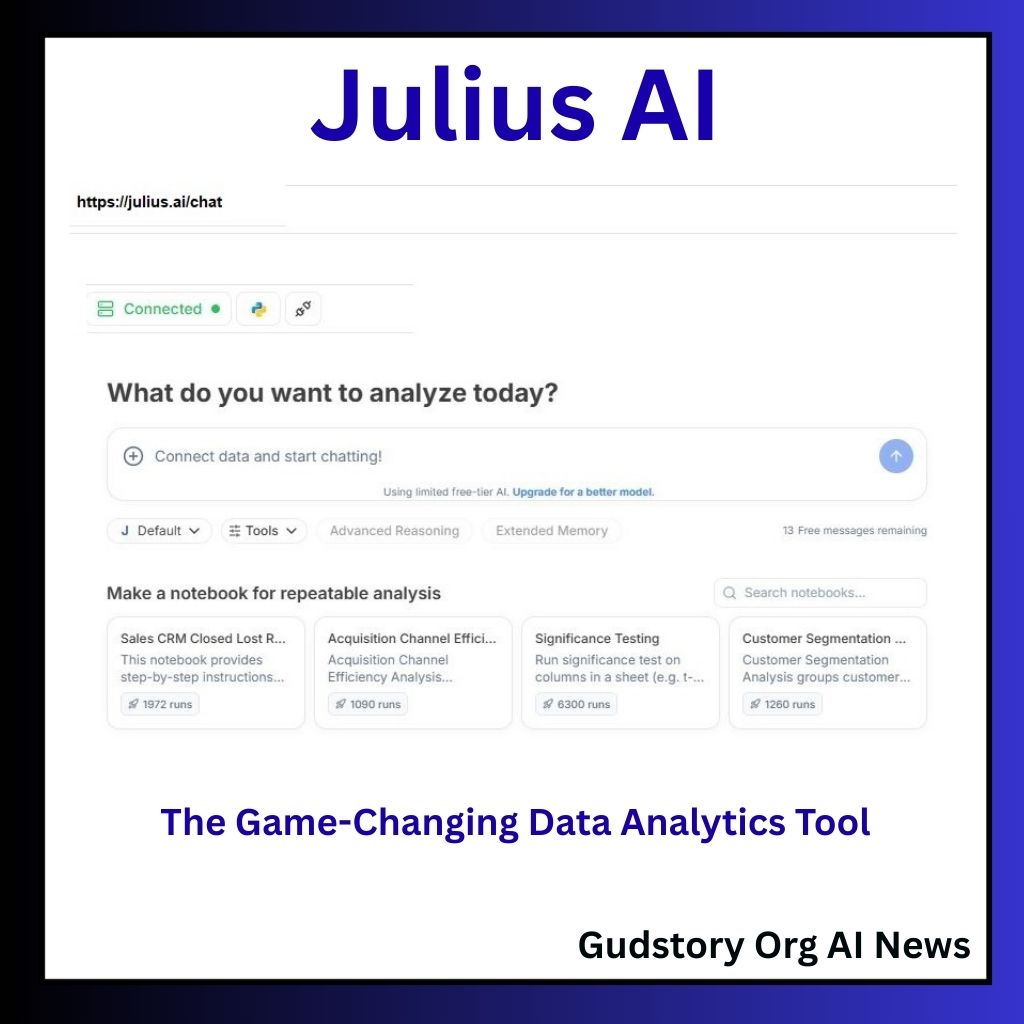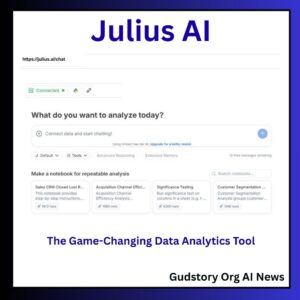Julius AI: The Game-Changing Data Analytics Tool Making Waves in 2025
September 13, 2025 | Gudstory Org AI News
Thank you for reading this post, don't forget to subscribe!The world of data analytics is experiencing a revolutionary shift, and at the center of this transformation is Julius AI, a conversational data analyst that’s democratizing data insights for teams across industries. With millions of users already on board and a fresh $10 million seed funding round in their pocket, Julius AI is positioning itself as the go-to solution for organizations looking to unlock the power of their data without the technical complexity.
Breaking Down the Data Barrier
For years, businesses have struggled with a fundamental problem: valuable data trapped in spreadsheets, databases, and cloud storage, but lacking the technical expertise to extract meaningful insights. Julius AI has emerged as the bridge between complex data and actionable intelligence, allowing users to simply ask questions in plain English and receive comprehensive analyses in return.
“How did our marketing campaigns perform last quarter?” or “What’s driving our customer churn?” These are the types of questions that traditionally required a data scientist or hours of Excel manipulation. Julius AI transforms these inquiries into instant visualizations, statistical analyses, and clear explanations that anyone can understand.
The Technology Behind the Magic
What sets Julius AI apart is its sophisticated approach to data analysis. Rather than providing simple chatbot responses, the platform employs large language models to interpret user questions, then generates and executes actual Python and SQL code behind the scenes. This hybrid methodology ensures accuracy and auditability while maintaining the simplicity of natural language interaction.
The platform runs these computations in isolated, secure containers with configurable resources, then translates the results back into human-readable formats complete with charts, tables, and explanatory summaries. Users can even inspect the generated code to understand exactly how their analysis was performed.
Features That Matter for Modern Teams
Julius AI has built an impressive feature set that addresses real-world business needs:
Universal Data Connectivity: The platform connects directly to popular databases like PostgreSQL, BigQuery, and Snowflake, as well as cloud storage services like Google Drive and OneDrive. This eliminates the tedious process of manual data exports and ensures analyses are always based on current information.
Collaborative Workspaces: Teams can share analyses, set up role-based permissions, and create reproducible workflows that can be re-run with fresh data. This feature has proven particularly valuable for recurring reporting needs.
Automation Capabilities: Recent updates have introduced scheduled analyses, allowing teams to automatically generate reports and insights on a regular cadence without manual intervention.
Enterprise-Ready Security: With SOC 2 Type II and TX-RAMP compliance, Julius AI is positioning itself for enterprise adoption while working toward GDPR certification.
Who’s Benefiting Most?
The platform has found particular success among specific user groups:
Marketing Teams are leveraging Julius for campaign attribution analysis and customer segmentation without waiting for technical support. Product managers use it for funnel analysis and A/B testing insights, while finance teams rely on it for forecasting and variance analysis.
Educational institutions and researchers have also embraced the platform for its ability to rapidly explore datasets and create reproducible analytical workflows that can be shared and verified.
The Investment Validation
The recent $10 million seed funding round, led by Bessemer Venture Partners with participation from Y Combinator, signals strong investor confidence in Julius AI’s approach. This capital injection comes at a time when the platform claims to have facilitated millions of visualizations for its growing user base.
The funding will accelerate product development, particularly in expanding database integrations and enterprise features, while supporting the company’s go-to-market efforts in an increasingly competitive landscape.
Pricing Strategy for Different Needs
Julius AI offers a tiered pricing structure designed to accommodate various user needs. The company provides a free tier for basic usage, while paid plans starting around $20 monthly for the Lite version remove message limitations and provide enhanced computing resources. Enterprise plans include team collaboration features and priority support with custom pricing based on organizational requirements.
Navigating the Limitations
Despite its impressive capabilities, Julius AI isn’t without limitations that users should consider. As with any AI-powered analytics tool, there’s always the risk of misinterpretation or inappropriate statistical assumptions. Critical business decisions should always include human oversight and validation of results.
The platform excels at common analytical tasks but may not replace specialized data science work for highly complex statistical modeling or custom data engineering requirements. Additionally, organizations handling sensitive data should carefully evaluate the platform’s security measures and data governance policies.
Getting Started in the Julius Era
For organizations considering Julius AI, the recommended approach is straightforward: start small with a free account and a simple dataset to understand how the platform interprets questions and generates analyses. The key is to validate outputs by examining the generated code and comparing results against known benchmarks.
As teams become comfortable with the platform’s capabilities, they can gradually integrate live data sources and build more sophisticated analytical workflows that can be shared across the organization.
The Broader Impact
Julius AI represents a significant step toward the democratization of data analytics. By removing technical barriers and reducing the time from question to insight from hours to minutes, the platform is enabling data-driven decision making at organizations that previously couldn’t justify the cost of dedicated analytics resources.
As we progress through 2025, tools like Julius AI are reshaping expectations about data accessibility and analytical capability. The question is no longer whether organizations can afford sophisticated data analysis, but whether they can afford to operate without it.
The success of Julius AI reflects a broader trend toward no-code and low-code solutions that empower business users to accomplish tasks that once required specialized technical skills. As the platform continues to evolve and expand its capabilities, it’s likely to play an increasingly important role in how organizations understand and leverage their data assets.
For businesses sitting on untapped data resources, Julius AI offers a compelling proposition: the ability to unlock insights and drive decisions without the traditional barriers of technical complexity or resource constraints. In an era where data-driven decision making is no longer optional, platforms like Julius AI are making analytics accessible to everyone.


